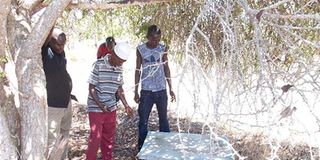Boni suffer as ban on accessing forest hurts honey production

Some members of the Boni community inspecting beehives inside Boni Forest. Beekeeping has totally collapsed following restrictions by the government against accessing the forest due to security reasons. PHOTO | KALUME KAZUNGU | NATION MEDIA GROUP
What you need to know:
- They can no longer harvest honey, wild fruits gathering or even go hunting.
- Most of them had also to quit the trade due to lack of market for their honey.
- Mr Doza says they no longer receive aid as almost all well-wishers have shied away from the region.
Bee keeping among the Boni who live in Lamu County has totally collapsed following a prolonged government ban from accessing the Boni forest for security reasons.
The Boni, who are the major honey producers in the county, are now languishing in poverty after their main source of livelihood was affected by the ongoing multi-agency security Operation Linda Boni which has been denying them access to their ancestral forest.
The operation was launched in September 2015 with the aim of flushing out Al-Shabaab militants believed to be hiding inside the dense forest.
Following the operation, the Boni, who are traditionally hunters and gatherers, have not been allowed to proceed with their activities, a move which they say has directly affected their lives.
They can no longer harvest honey, wild fruits gathering or even go hunting.
RESTRICTIONS
Speaking to the Nation in Basuba, Milimani, Mangai, Mararani and Kiangwe villages, all of which are within Boni Forest, the residents said they are unable to do bee keeping in their villages due to the many restriction that have been imposed since the security operation started four years ago.
Musa Tete, a bee keeper from Milimani, said apart from the restriction from accessing Boni Forest, most of them had to quit the trade due to lack of market for their honey.
Mr Tete said the frequent Al-Shabaab attacks that have been witnessed in the region between 2014 and 2018 forced many of their customers who used to drive from various parts of the country to buy honey in bulk from them no longer do so.
BEEHIVES
“It’s in the forest where we place our beehives. We still use the traditional methods of beekeeping. It’s unfortunate that the government has denied us access to the forest and many of us were discouraged and quit the trade. Terrorism has also robbed us of our major customers who used to travel from far to buy honey in bulk from us. That no longer happens. Beekeeping is now a thing of the past among the Boni,” said Mr Tete.
In 2016, the Boni complained that thousands of litres of honey were getting spoilt daily in their villages since they had no ready market for it.
Mr Suleiman Abdi said such frustrations also contributed the Boni to leave the venture and engage in modern farming.
PLEA TO GOVERNMENT
Mr Abdi called on the national government to consider allowing the Boni to access the forest.
“Immediately after the introduction of the Linda Boni operation, our forest was declared a no-go zone by the Kenya Defence Forces (KDF). Four years have now passed and we are told normalcy has been restored. We are therefore urging the government to allow us to venture into the forest. We want to revive bee keeping in our villages but that can only happen if we are allowed to access the forest,” said Mr Abdi.
Mr Doza Diza, a Boni elder, said the insecurity in Basuba Ward resulted to some well-wishers who used to sponsor beekeeping ventures to stop.
In 2015 for example, the Wild Wide Fund for Nature (WWF) purchased 90 modern beehives to facilitate modern honey farming for the Boni.
Mr Doza says they no longer receive such aid as almost all well-wishers have shied away from the region.
“Insecurity has dealt us a blow. We used to receive assistance from various non-governmental organisations but since insecurity incidents started in this region, many of the well-wishers have kept off,” said Mr Doza.





